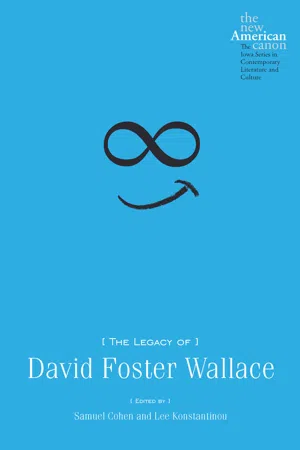
eBook - PDF
The Legacy of David Foster Wallace
- English
- PDF
- Available on iOS & Android
eBook - PDF
The Legacy of David Foster Wallace
About this book
Considered by many to be the greatest writer of his generation, David Foster Wallace was at the height of his creative powers when he committed suicide in 2008. In a sweeping portrait of Wallace's writing and thought and as a measure of his importance in literary history, The Legacy of David Foster Wallace gathers cutting-edge, field-defining scholarship by critics alongside remembrances by many of his writer friends, who include some of the world's most influential authors.
In this elegant volume, literary critics scrutinize the existing Wallace scholarship and at the same time pioneer new ways of understanding Wallace's fiction and journalism. In critical essays exploring a variety of topics—including Wallace's relationship to American literary history, his place in literary journalism, his complicated relationship to his postmodernist predecessors, the formal difficulties of his 1996 magnum opus Infinite Jest, his environmental imagination, and the "social life" of his fiction and nonfiction—contributors plumb sources as diverse as Amazon.com reader recommendations, professional book reviews, the 2009 Infinite Summer project, and the David Foster Wallace archive at the University of Texas's Harry Ransom Center.
The creative writers—including Don DeLillo, Jonathan Franzen, George Saunders, Rick Moody, Dave Eggers, and David Lipsky, and Wallace's Little, Brown editor, Michael Pietsch—reflect on the person behind the volumes of fiction and nonfiction created during the author's too-short life.
All of the essays, critical and creative alike, are written in an accessible style that does not presume any background in Wallace criticism. Whether the reader is an expert in all things David Foster Wallace, a casual fan of his fiction and nonfiction, or completely new to Wallace, The Legacy of David Foster Wallace will reveal the power and innovation that defined his contribution to literary life and to self-understanding. This illuminating volume is destined to shape our understanding of Wallace, his writing, and his place in history.
Frequently asked questions
Yes, you can cancel anytime from the Subscription tab in your account settings on the Perlego website. Your subscription will stay active until the end of your current billing period. Learn how to cancel your subscription.
No, books cannot be downloaded as external files, such as PDFs, for use outside of Perlego. However, you can download books within the Perlego app for offline reading on mobile or tablet. Learn more here.
Perlego offers two plans: Essential and Complete
- Essential is ideal for learners and professionals who enjoy exploring a wide range of subjects. Access the Essential Library with 800,000+ trusted titles and best-sellers across business, personal growth, and the humanities. Includes unlimited reading time and Standard Read Aloud voice.
- Complete: Perfect for advanced learners and researchers needing full, unrestricted access. Unlock 1.4M+ books across hundreds of subjects, including academic and specialized titles. The Complete Plan also includes advanced features like Premium Read Aloud and Research Assistant.
We are an online textbook subscription service, where you can get access to an entire online library for less than the price of a single book per month. With over 1 million books across 1000+ topics, we’ve got you covered! Learn more here.
Look out for the read-aloud symbol on your next book to see if you can listen to it. The read-aloud tool reads text aloud for you, highlighting the text as it is being read. You can pause it, speed it up and slow it down. Learn more here.
Yes! You can use the Perlego app on both iOS or Android devices to read anytime, anywhere — even offline. Perfect for commutes or when you’re on the go.
Please note we cannot support devices running on iOS 13 and Android 7 or earlier. Learn more about using the app.
Please note we cannot support devices running on iOS 13 and Android 7 or earlier. Learn more about using the app.
Yes, you can access The Legacy of David Foster Wallace by Samuel Cohen, Lee Konstantinou, Samuel Cohen,Lee Konstantinou in PDF and/or ePUB format, as well as other popular books in Literature & Literary Criticism. We have over one million books available in our catalogue for you to explore.
Information
Table of contents
- Contents
- Acknowledgments
- Samuel Cohen and Lee Konstantinou - Introduction: Zoologists, Elephants, and Editors
- Part 1: History
- Part 2: Aesthetics
- Part 3: Community
- Notes on Contributors
- Permissions
- Index